初中英语语法 形容词
- 格式:docx
- 大小:25.32 KB
- 文档页数:8
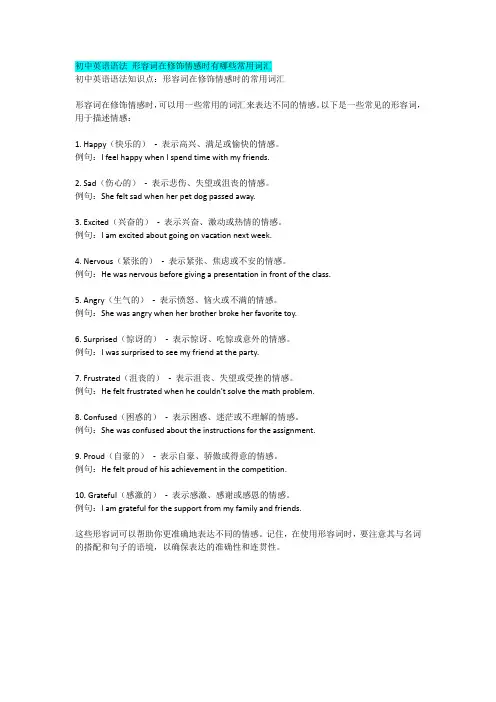
初中英语语法形容词在修饰情感时有哪些常用词汇初中英语语法知识点:形容词在修饰情感时的常用词汇形容词在修饰情感时,可以用一些常用的词汇来表达不同的情感。
以下是一些常见的形容词,用于描述情感:1. Happy(快乐的)-表示高兴、满足或愉快的情感。
例句:I feel happy when I spend time with my friends.2. Sad(伤心的)-表示悲伤、失望或沮丧的情感。
例句:She felt sad when her pet dog passed away.3. Excited(兴奋的)-表示兴奋、激动或热情的情感。
例句:I am excited about going on vacation next week.4. Nervous(紧张的)-表示紧张、焦虑或不安的情感。
例句:He was nervous before giving a presentation in front of the class.5. Angry(生气的)-表示愤怒、恼火或不满的情感。
例句:She was angry when her brother broke her favorite toy.6. Surprised(惊讶的)-表示惊讶、吃惊或意外的情感。
例句:I was surprised to see my friend at the party.7. Frustrated(沮丧的)-表示沮丧、失望或受挫的情感。
例句:He felt frustrated when he couldn't solve the math problem.8. Confused(困惑的)-表示困惑、迷茫或不理解的情感。
例句:She was confused about the instructions for the assignment.9. Proud(自豪的)-表示自豪、骄傲或得意的情感。
例句:He felt proud of his achievement in the competition.10. Grateful(感激的)-表示感激、感谢或感恩的情感。
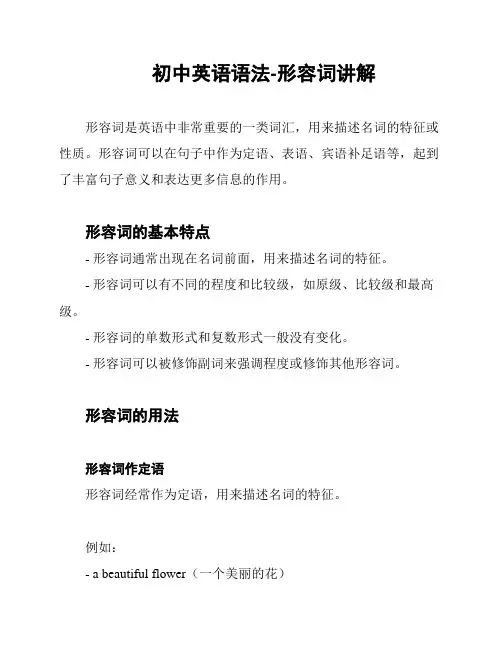
初中英语语法-形容词讲解形容词是英语中非常重要的一类词汇,用来描述名词的特征或性质。
形容词可以在句子中作为定语、表语、宾语补足语等,起到了丰富句子意义和表达更多信息的作用。
形容词的基本特点- 形容词通常出现在名词前面,用来描述名词的特征。
- 形容词可以有不同的程度和比较级,如原级、比较级和最高级。
- 形容词的单数形式和复数形式一般没有变化。
- 形容词可以被修饰副词来强调程度或修饰其他形容词。
形容词的用法形容词作定语形容词经常作为定语,用来描述名词的特征。
例如:- a beautiful flower(一个美丽的花)- the big house(大房子)形容词作表语形容词可以作为表语,用来说明主语的状态、特征或性质。
例如:- She is happy.(她很开心。
)- The car looks new.(这辆车看起来很新。
)形容词作宾语补足语形容词也可以作为宾语补足语,用来描述宾语。
例如:- I find the movie interesting.(我觉得这部电影很有趣。
)- They made him angry.(他们让他生气了。
)形容词的比较级和最高级形容词比较级形容词可以用来比较两个事物的程度或大小。
- 一般情况下,我们在形容词后面加上-er来表示比较级。
- 如果形容词以字母e结尾,只需加-r,不需要再加e。
- 如果形容词以辅音字母+y结尾,要将y变为i,再加-er。
- 有些形容词的比较级形式需要变化,如good(好)- better(更好)、bad(坏)- worse(更差)等。
例如:- This book is longer than that book.(这本书比那本书长。
)- She is taller than her sister.(她比她姐姐高。
)形容词最高级形容词可以用来表示三个或三个以上事物之间的最高程度或大小。
- 一般情况下,我们在形容词前面加上the和-est来表示最高级。
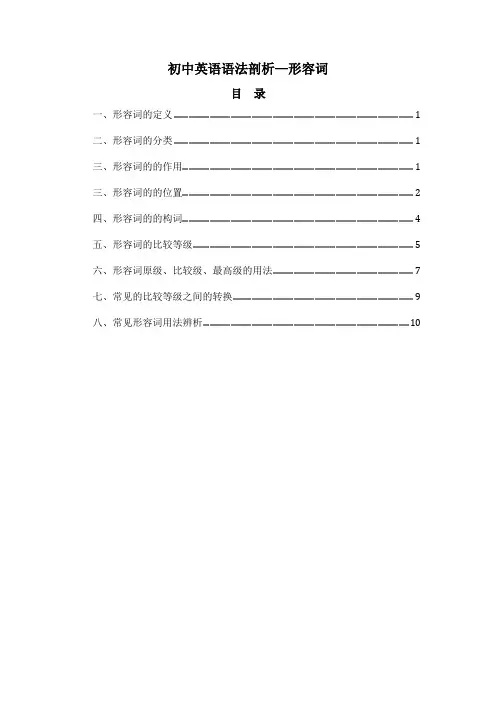
初中英语语法剖析—形容词目录一、形容词的定义 (1)二、形容词的分类 (1)三、形容词的的作用 (1)三、形容词的的位置 (2)四、形容词的的构词 (4)五、形容词的比较等级 (5)六、形容词原级、比较级、最高级的用法 (7)七、常见的比较等级之间的转换 (9)八、常见形容词用法辨析 (10)初中英语语法—形容词一、形容词的定义用来修饰名词或者部分代词的词。
形容词一般翻译成“……的”。
eg:他是一个漂亮的女孩。
(形容词修饰名词)(形容词修饰代词)二、形容词的分类三、形容词的的作用(1)作表语。
形容词常常用在连系动词be, look, get, become, feel, taste, smell, seem, sound等后面作表语,构成“主—系—表”结构。
❶放在状态系动词(Be动词)之后。
eg:The bike is expensive.这俩自行车很贵。
I am busy now.我现在很忙❷ 放在持续系动词之后。
eg:You must keep warm. 你一定要保暖。
He always stays happy in class. 他总是在课堂上保持快乐。
❸ 放在像系动词之后。
eg:He looks polite.他看起来很有礼貌。
He seems very sad. 他看起来很伤心。
❹ 放在感官系动词之后。
eg:The scarf feels soft.这条围巾感觉柔软。
This flower smells nice. 这朵花闻起来很香。
❺放在变化系动词之后。
eg:The leaves turn green. 叶子变绿了。
The egg becomes bigger.鸡蛋变得更大了。
(2)作定语。
形容词常常用在名词的前面,用于修饰名词(中心词)。
eg:She is a good student.她是一个好学生。
I have an old friend.我有一个老朋友。
She is a beautiful girl. 她是一个漂亮的女孩。
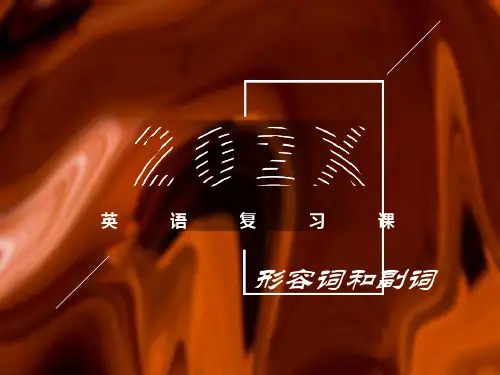

初中英语语法形容词在修饰物体时有哪些常用词汇当形容词用于修饰物体时,有许多常用的词汇。
以下是一些常见的形容词,它们可以用于描述物体的不同特征和属性:1. 大小:big, small, large, tiny, huge, massive, miniature, enormous2. 形状:round, square, rectangular, triangular, oval, cylindrical, spherical3. 颜色:red, blue, green, yellow, black, white, pink, purple, orange4. 材质:wooden, metal, plastic, glass, ceramic, leather, fabric, paper5. 温度:hot, cold, warm, cool, freezing6. 年龄:old, young, new, ancient, modern7. 品质:good, bad, excellent, poor, high-quality, low-quality8. 速度:fast, slow, quick, rapid, slow-moving9. 重量:heavy, light, weighty, lightweight10. 声音:loud, quiet, noisy, silent11. 位置:high, low, middle, top, bottom, left, right12. 质地:smooth, rough, soft, hard, silky, coarse13. 亮度:bright, dull, shiny, glossy, matte14. 味道:sweet, sour, salty, bitter, delicious, tasteless15. 强度:strong, weak, powerful, feeble这些形容词可以根据具体的物体属性进行选择和组合,以便更准确地描述物体的特征。
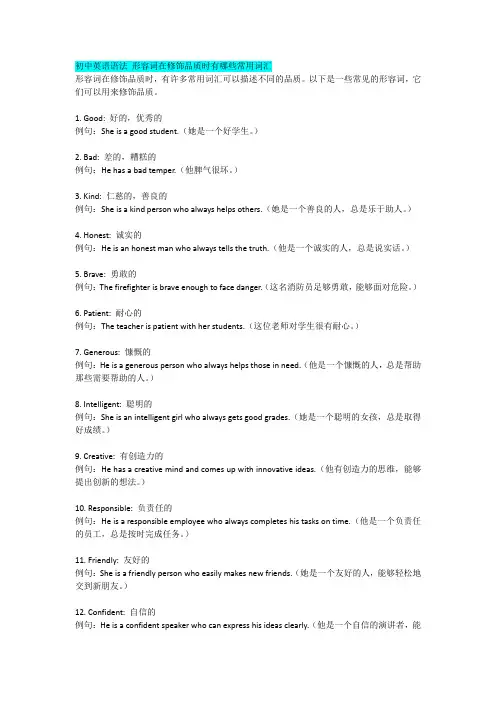
初中英语语法形容词在修饰品质时有哪些常用词汇形容词在修饰品质时,有许多常用词汇可以描述不同的品质。
以下是一些常见的形容词,它们可以用来修饰品质。
1. Good: 好的,优秀的例句:She is a good student.(她是一个好学生。
)2. Bad: 差的,糟糕的例句:He has a bad temper.(他脾气很坏。
)3. Kind: 仁慈的,善良的例句:She is a kind person who always helps others.(她是一个善良的人,总是乐于助人。
)4. Honest: 诚实的例句:He is an honest man who always tells the truth.(他是一个诚实的人,总是说实话。
)5. Brave: 勇敢的例句:The firefighter is brave enough to face danger.(这名消防员足够勇敢,能够面对危险。
)6. Patient: 耐心的例句:The teacher is patient with her students.(这位老师对学生很有耐心。
)7. Generous: 慷慨的例句:He is a generous person who always helps those in need.(他是一个慷慨的人,总是帮助那些需要帮助的人。
)8. Intelligent: 聪明的例句:She is an intelligent girl who always gets good grades.(她是一个聪明的女孩,总是取得好成绩。
)9. Creative: 有创造力的例句:He has a creative mind and comes up with innovative ideas.(他有创造力的思维,能够提出创新的想法。
)10. Responsible: 负责任的例句:He is a responsible employee who always completes his tasks on time.(他是一个负责任的员工,总是按时完成任务。
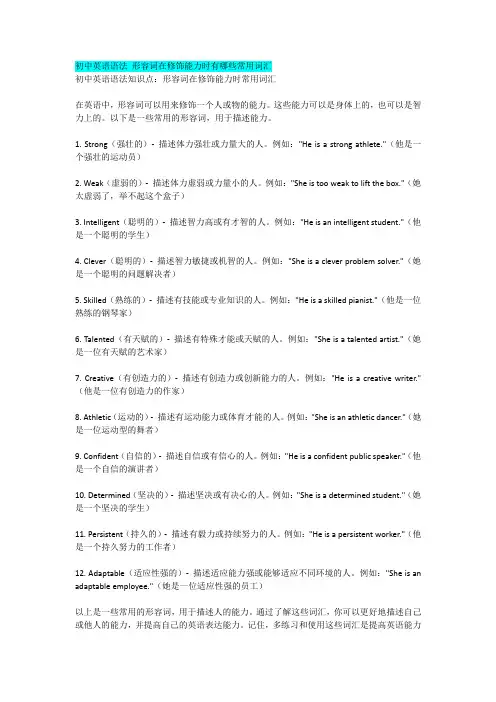
初中英语语法形容词在修饰能力时有哪些常用词汇初中英语语法知识点:形容词在修饰能力时常用词汇在英语中,形容词可以用来修饰一个人或物的能力。
这些能力可以是身体上的,也可以是智力上的。
以下是一些常用的形容词,用于描述能力。
1. Strong(强壮的)-描述体力强壮或力量大的人。
例如:"He is a strong athlete."(他是一个强壮的运动员)2. Weak(虚弱的)-描述体力虚弱或力量小的人。
例如:"She is too weak to lift the box."(她太虚弱了,举不起这个盒子)3. Intelligent(聪明的)-描述智力高或有才智的人。
例如:"He is an intelligent student."(他是一个聪明的学生)4. Clever(聪明的)-描述智力敏捷或机智的人。
例如:"She is a clever problem solver."(她是一个聪明的问题解决者)5. Skilled(熟练的)-描述有技能或专业知识的人。
例如:"He is a skilled pianist."(他是一位熟练的钢琴家)6. Talented(有天赋的)-描述有特殊才能或天赋的人。
例如:"She is a talented artist."(她是一位有天赋的艺术家)7. Creative(有创造力的)-描述有创造力或创新能力的人。
例如:"He is a creative writer."(他是一位有创造力的作家)8. Athletic(运动的)-描述有运动能力或体育才能的人。
例如:"She is an athletic dancer."(她是一位运动型的舞者)9. Confident(自信的)-描述自信或有信心的人。
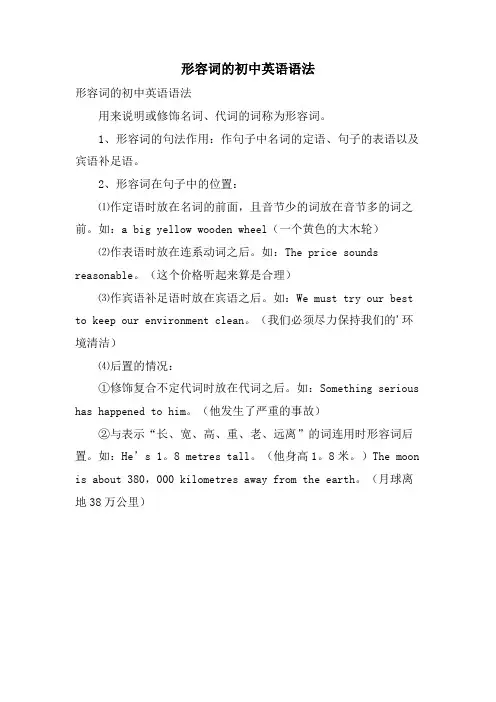
形容词的初中英语语法
形容词的初中英语语法
用来说明或修饰名词、代词的词称为形容词。
1、形容词的句法作用:作句子中名词的定语、句子的表语以及宾语补足语。
2、形容词在句子中的位置:
⑴作定语时放在名词的前面,且音节少的词放在音节多的词之前。
如:a big yellow wooden wheel(一个黄色的大木轮)
⑵作表语时放在连系动词之后。
如:The price sounds reasonable。
(这个价格听起来算是合理)
⑶作宾语补足语时放在宾语之后。
如:We must try our best to keep our environment clean。
(我们必须尽力保持我们的'环境清洁)
⑷后置的情况:
①修饰复合不定代词时放在代词之后。
如:Something serious has happened to him。
(他发生了严重的事故)
②与表示“长、宽、高、重、老、远离”的词连用时形容词后置。
如:He’s 1。
8 metres tall。
(他身高1。
8米。
)The moon is about 380,000 kilometres away from the earth。
(月球离地38万公里)。
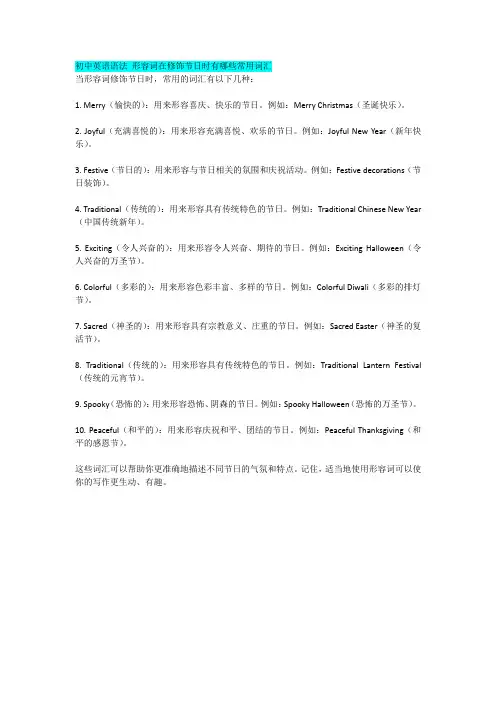
初中英语语法形容词在修饰节日时有哪些常用词汇当形容词修饰节日时,常用的词汇有以下几种:1. Merry(愉快的):用来形容喜庆、快乐的节日。
例如:Merry Christmas(圣诞快乐)。
2. Joyful(充满喜悦的):用来形容充满喜悦、欢乐的节日。
例如:Joyful New Year(新年快乐)。
3. Festive(节日的):用来形容与节日相关的氛围和庆祝活动。
例如:Festive decorations(节日装饰)。
4. Traditional(传统的):用来形容具有传统特色的节日。
例如:Traditional Chinese New Year (中国传统新年)。
5. Exciting(令人兴奋的):用来形容令人兴奋、期待的节日。
例如:Exciting Halloween(令人兴奋的万圣节)。
6. Colorful(多彩的):用来形容色彩丰富、多样的节日。
例如:Colorful Diwali(多彩的排灯节)。
7. Sacred(神圣的):用来形容具有宗教意义、庄重的节日。
例如:Sacred Easter(神圣的复活节)。
8. Traditional(传统的):用来形容具有传统特色的节日。
例如:Traditional Lantern Festival (传统的元宵节)。
9. Spooky(恐怖的):用来形容恐怖、阴森的节日。
例如:Spooky Halloween(恐怖的万圣节)。
10. Peaceful(和平的):用来形容庆祝和平、团结的节日。
例如:Peaceful Thanksgiving(和平的感恩节)。
这些词汇可以帮助你更准确地描述不同节日的气氛和特点。
记住,适当地使用形容词可以使你的写作更生动、有趣。
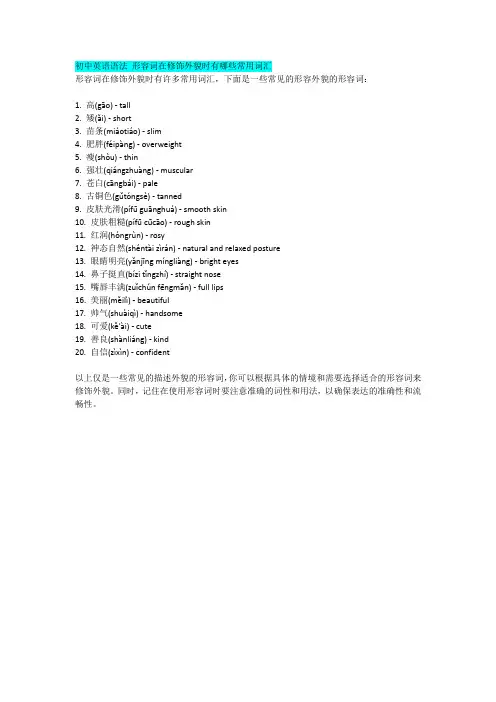
初中英语语法形容词在修饰外貌时有哪些常用词汇形容词在修饰外貌时有许多常用词汇,下面是一些常见的形容外貌的形容词:1. 高(gāo) - tall2. 矮(ǎi) - short3. 苗条(miáotiáo) - slim4. 肥胖(féipàng) - overweight5. 瘦(shòu) - thin6. 强壮(qiángzhuàng) - muscular7. 苍白(cāngbái) - pale8. 古铜色(gǔtóngsè) - tanned9. 皮肤光滑(pífū guānghuá) - smooth skin10. 皮肤粗糙(pífū cūcāo) - rough skin11. 红润(hóngrùn) - rosy12. 神态自然(shéntài zìrán) - natural and relaxed posture13. 眼睛明亮(yǎnjīng míngliàng) - bright eyes14. 鼻子挺直(bízi tǐngzhí) - straight nose15. 嘴唇丰满(zuǐchún fēngmǎn) - full lips16. 美丽(měilì) - beautiful17. 帅气(shuàiqì) - handsome18. 可爱(kě'ài) - cute19. 善良(shànliáng) - kind20. 自信(zìxìn) - confident以上仅是一些常见的描述外貌的形容词,你可以根据具体的情境和需要选择适合的形容词来修饰外貌。

初中英语语法形容词在修饰地点时有哪些常用词汇当形容词用于修饰地点时,有许多常用词汇可以使用。
以下是一些常见的形容词与地点相关的词汇:1. 大Small: 小的Small, tiny, little, miniature, minuscule2. 大Big: 大的Big, large, huge, enormous, massive3. 高Tall: 高的Tall, high, lofty, towering, elevated4. 低Low: 低的Low, short, small, shallow, flat5. 宽Wide: 宽的Wide, broad, spacious, expansive, extensive6. 窄Narrow: 窄的Narrow, thin, slim, slender, tight7. 近Close: 近的Close, near, nearby, adjacent, neighboring8. 远Far: 远的Far, distant, remote, faraway, outlying9. 平坦Flat: 平坦的Flat, level, even, smooth, plain10. 坡斜Sloping: 倾斜的Sloping, slanted, inclined, tilted, angled11. 繁忙Busy: 忙碌的Busy, bustling, lively, hectic, active12. 安静Quiet: 安静的Quiet, peaceful, calm, tranquil, serene13. 拥挤Crowded: 拥挤的Crowded, congested, packed, crowded, cramped14. 干燥Dry: 干燥的Dry, arid, parched, desolate, barren15. 潮湿Wet: 潮湿的Wet, moist, damp, humid, soggy16. 美丽Beautiful: 美丽的Beautiful, gorgeous, stunning, picturesque, scenic17. 冷Cold: 冷的Cold, chilly, freezing, frigid, icy18. 热Hot: 热的Hot, warm, scorching, sweltering, boiling19. 明亮Bright: 明亮的Bright, sunny, radiant, luminous, glowing20. 黑暗Dark: 黑暗的Dark, dim, gloomy, shadowy, murky以上是一些常用的形容词与地点相关的词汇,可以根据具体情况选择合适的词汇来描述地点的特征。
初中英语语法形容词在修饰性格时有哪些常用词汇
当形容词用于修饰性格时,我们可以使用许多常用词汇来描述人的个性特征。
以下是一些常见的形容词,用于描述不同类型的性格:
1. Friendly(友好的)-善良、友善、热情、和蔼可亲
2. Outgoing(外向的)-外向、开朗、喜欢社交、活跃
3. Shy(害羞的)-害羞、内向、胆小、不爱社交
4. Confident(自信的)-自信、自信心强、有自信
5. Ambitious(有抱负的)-有抱负、有雄心壮志、积极向上
6. Independent(独立的)-独立、自主、能够独自完成任务
7. Reliable(可靠的)-可靠、值得信赖、可依赖
8. Patient(耐心的)-耐心、有耐心、能够等待
9. Determined(坚决的)-坚决、有决心、毫不动摇
10. Creative(有创造力的)-有创造力、有创意、富有想象力
11. Humble(谦虚的)-谦虚、谦逊、不自负
12. Optimistic(乐观的)-乐观、积极、看到问题的好的一面
13. Pessimistic(悲观的)-悲观、消极、看到问题的坏的一面
14. Honest(诚实的)-诚实、真实、不说谎
15. Caring(关心他人的)-关心、关怀、体贴
这些词汇可以帮助你描述一个人的性格特征。
记住,每个人都有不同的性格特点,所以不同的词汇可以用来描述不同的人。
初中英语语法形容词在修饰质地时有哪些常用词汇初中英语语法知识点:形容词在修饰质地时的常用词汇在初中英语中,形容词常常用来描述事物的质地。
通过使用适当的形容词,我们可以更准确地表达事物的特征和特性。
下面是一些常用的形容词,用来描述事物的质地。
1. Soft(柔软的):指物体表面光滑、容易弯曲的特性。
例句:The pillow is soft and comfortable.这个枕头柔软舒适。
2. Hard(硬的):指物体坚硬、不易弯曲的特性。
例句:The table is made of hard wood.这张桌子是用硬木制成的。
3. Smooth(光滑的):指物体表面平整、没有凹凸的特性。
例句:The pebble is smooth and shiny.这个小石子光滑而有光泽。
4. Rough(粗糙的):指物体表面不平整、有纹理或凹凸不平的特性。
例句:The wall has a rough texture.这面墙有粗糙的质地。
5. Coarse(粗糙的):与rough类似,指物体表面不平整、有颗粒或纤维的特性。
例句:The sandpaper has a coarse texture.这个砂纸有粗糙的质地。
6. Smooth(光滑的):指物体表面平整、没有凹凸的特性。
例句:The silk fabric feels smooth to the touch.这种丝绸面料触感光滑。
7. Silky(丝绸般的):指物体质地像丝绸一样柔软、光滑。
例句:The puppy's fur is silky and shiny.小狗的毛发柔软光滑。
8. Fuzzy(绒毛的):指物体表面有绒毛或绒毛状的特性。
例句:The peach has a fuzzy skin.这个桃子有绒毛状的皮肤。
9. Sticky(粘性的):指物体表面具有黏性或粘附的特性。
例句:The glue is sticky and hard to remove.这个胶水粘性很大,很难清除。
初中英语语法形容词在修饰味道时有哪些常用词汇形容词在修饰味道时,我们可以使用各种形容词来描述不同的味道特征。
以下是一些常用的形容词,用于描述不同的味道:1. 酸(sour):酸味的,像柠檬或醋一样的味道。
例句:The lemonade is too sour for my taste.(这杯柠檬水太酸了,我不喜欢。
)2. 甜(sweet):甜味的,像糖或水果一样的味道。
例句:The cake is really sweet and delicious.(这个蛋糕真的又甜又好吃。
)3. 苦(bitter):苦味的,像咖啡或可可粉一样的味道。
例句:The medicine has a bitter taste, but it will make you feel better.(这种药有一种苦味,但它会让你感觉好些。
)4. 辣(spicy):辣味的,像辣椒或姜一样的味道。
例句:The curry is too spicy for me.(这个咖喱对我来说太辣了。
)5. 咸(salty):咸味的,像盐或海水一样的味道。
例句:The soup is a bit too salty.(这汤有点咸。
)6. 香(fragrant):香味的,像花朵或香料一样的味道。
例句:The freshly baked bread smells so fragrant.(新鲜出炉的面包闻起来好香。
)7. 清淡(mild):味道淡的,不强烈的。
例句:The salad dressing is mild and doesn't overpower the vegetables.(沙拉酱味道很清淡,不会掩盖蔬菜的味道。
)8. 浓郁(rich):味道浓厚的,具有深深的层次感。
例句:The chocolate has a rich flavor that melts in your mouth.(巧克力有着浓郁的味道,融化在口中。
初中英语语法形容词学校英语语法形容词语法是英语考试中的重中之重,所占分值也多。
提高英语力量的方法是多读多练多积累。
我在这里整理了学校英语语法形容词供大家阅读,盼望能关心到您。
学校英语语法形容词A:形容词1、形容词及其用法形容词修饰名词,说明事物或人的性质或特征。
通常,可将形容词分成性质形容词和叙述形容词两类,其位置不肯定都放在名词前面。
1) 直接说明事物的性质或特征的形容词是性质形容词,它有级的变化,可以用程度副词修饰,在句中可作定语、表语和补语。
例如:hot 热的。
2) 叙述形容词只能作表语,所以又称为表语形容词。
这类形容词没有级的变化,也不行用程度副词修饰。
大多数以a开头的形容词都属于这一类。
例如:afraid 可怕的。
(错) He is an ill man.(对) The man is ill.(错) She is an afraid girl.(对) The girl is afraid.这类词还有: well,unwell,ill,faint,afraid,alike,alive,alone,asleep,awake 等。
3)形容词作定语修饰名词时,要放在名词的前边。
但是假如形容词修饰以-thing为字尾的词语时,要放在这些词之后,例如:something nice2. 以-ly结尾的形容词1) 大部分形容词加-ly可构成副词。
但 friendly,deadly,lovely,lonely,likely,lively,ugly,brotherly,仍为形容词。
改错:(错) She sang lovely.(错) He spoke to me very friendly.(对) Her singing was lovely.(对) He spoke to me in a very friendly way.2)有些以-ly 结尾既为形容词,也为副词。
daily,weekly,monthly,yearly,earlyThe Times is a daily paper.The Times is published daily.3 用形容词表示类别和整体1) 某些形容词加上定冠词可以泛指一类人,与谓语动词的复数连接。
初中英语语法形容词在修饰季节时有哪些常用词汇当形容词修饰季节时,常用的词汇有以下几种:1. Hot(炎热的):用来描述夏季。
例如:hot summer(炎热的夏季)。
2. Cold(寒冷的):用来描述冬季。
例如:cold winter(寒冷的冬季)。
3. Warm(温暖的):用来描述春季和秋季。
例如:warm spring(温暖的春季)、warm autumn (温暖的秋季)。
4. Cool(凉爽的):用来描述春季和秋季。
例如:cool spring(凉爽的春季)、cool autumn(凉爽的秋季)。
5. Sunny(阳光明媚的):用来描述阳光充沛的季节。
例如:sunny spring(阳光明媚的春季)、sunny summer(阳光明媚的夏季)。
6. Rainy(多雨的):用来描述有大量降雨的季节。
例如:rainy spring(多雨的春季)、rainy monsoon season(多雨的雨季)。
7. Windy(多风的):用来描述有强风的季节。
例如:windy autumn(多风的秋季)、windy winter (多风的冬季)。
8. Snowy(多雪的):用来描述有大量降雪的季节。
例如:snowy winter(多雪的冬季)、snowy holiday season(多雪的假期季节)。
9. Dry(干燥的):用来描述没有降水的季节。
例如:dry season(干燥的季节)、dry summer (干燥的夏季)。
10. Humid(潮湿的):用来描述湿度较高的季节。
例如:humid spring(潮湿的春季)、humid monsoon season(潮湿的雨季)。
这些词汇可以帮助你描述不同季节的天气特征。
记住,形容词只是修饰词,还需要结合其他词汇和句子来完整表达你想要表达的意思。
希望这些常用词汇对你有所帮助!如果你还有其他问题,我将继续为你解答。
初中英语语法词法部分(三)形容词(adj.) 和副词(adv.)一、形容词1、形容词:表示描述物体的大小颜色和性质的词,就是带“的”的词。
An adjective is a word that describes a person or thing ,or gives extra information about them. They usually come before nouns or after link verbs.2、形容词的位置(1)形容词一般放在名词前面:a nice day ;clean water ;good boys(2)形容词还可以放在系动词的后面:look beautiful ;taste yummy ;feel comfortable ;be good 等;(3)当形容词修饰由some-,any-,no-, every-构成的不定代词时,形容词要放在后面:something important;anything serious ;(4)形容词修饰补充说明宾语的性质、状态1) Running in the morning makes him strong.2) We think the film really interesting.3) Who has left the door open?二、副词(adverbial words are used mainly to modify a verb or a adjective )1. 程度副词:fairly, pretty, rather, quite, very, much, too, greatly, almost, nearly, half, highly在句中的位置: 一般放在被修饰的形容词或副词前面。
I am really sorry to hear that.The girls works very hard.The weather here is quite different from that in Nanjing.2. 时间副词:now, then, soon, ago, recently, lately, later, before, early, today, tomorrow, yesterday, tonight, suddenly, immediately, still, already, just等在句中的位置: 通常位于句末。
They went swimming in the river yesterday.Yesterday they went swimming in the river.3. 频度副词:always, usually, often, frequently, seldom, sometimes, never, hardly, rarely, constantly, occasionally等在句中的位置:通常普通动词前,be动词之后The boy is often late for school.I have never seen such a good film.4. 方式副词:表示行为方式的副词大多以ly结尾,如quietly, heavily, warmly, carefully, happily, politely, angrily等。
在句中的位置1) 通常放在动词后面。
She walked into the classroom happily.Mike wrote carefully some letters to his parents. My father works hard.2)修饰整个句子用作状语,放在句前。
Luckily, Jim catches the bus in time.三.形容词/副词的考点(原级、比较级和最高级)习题(一)()1、That boy looks as as a boxer.A. strongB. strongerC. strongestD. more strong()2、Then Summer Palace is than Zhong Shan park.A. biggerB. more bigC. the biggestD. bigger()3、Which do you like , apples or oranges?A. goodB. betterC. bestD. well()4、--Oh, the food is bad.--I think so .And the service(服务) is __________.A.the worst B.worse C.badder D.the worse()5、--You are the same coat as I.--Yes, Mine is , but not so as yours.A. better, expensiveB. better, more expensiveC. much better, more expensiveD. good, more expensive()6、The experts think that India’s population may be than China’s2020.A. much, byB. more, inC. larger, byD. larger, on()7、This year our school is than it was last year.A. much beautifulB. the most beautifulC.beautifulerD. much more beautifulA. The harder, moreB. The harder, the moreC. Harder, the moreD. Harder, more()9、He has friends than I.A. much moreB. many moreC. very moreD. too more()10、I’m not sure whether Mary can sing Ann.A. as well asB. as good asC. as better asD. so good as习题(二)()1、The news is surprising.A. muchB. veryC. moreD. very much()2、The population of China is larger than .A. AmericaB. the one of AmericasC. that of AmericaD. Americans()3、Which is clothing store in your town?A. the bestB. the betterC. the most goodD. best()4、My sister is person I know.A. the funniestB. the funnierC . the most fun D. funniest()5、Is Mr Du teacher in your school?A. the most busyB. the busierC. the most busiestD. the busiest()6、He is more beautiful than I.A. tooB. enoughC. muchD. very()7、The box is heavy .I can’t move it.A. muchB. moreC. enoughD. too()8、The book is the one in the bookshop.A.the most cheap B.the expensiveC.the most expensive D.the less expensiver()9、I have apples and milk than you.A. many, littleB. more, lessC. more, leastD. many, less()10、You should study English hard, because it’s getting in our country .A. more and more importantB. more important and more importantC. importanter and importanterD. important and important习题(三)1) My house is _______ (large) than Jim’s.2) Today is much _______ (warm) than yesterday.3) Which book is _______________ (interesting), this one or that one?4) Kate is _______ (good) than me at English.5) Who is __________ (tall) boy in your class?6) Mike runs __________ (fast) of all the students.7) I have _____ (much) money than you.8) My brother is not as ________ (strong) as me.9) Which film is _____________(interesting) ,this one or that one?10) I think English is one of _______________(important) subjects in middle school.11) Li Lei doesn't study as ______ _(care) as his sister.12) Ann is a little _______(young) than Joan, but she is much ____.(tall)13) The Changjiang River is very ____.It's the third ______ river in the world. (long)14) The Yellow River is the second ______(long) river in China.15) Zhao Lei is one of ___________ (young) boys in his school.16) Which is _________(big), the sun, the earth or the moon ?17) Mary has three brothers. Smith is ________(tall) of the three.18) Mount Qomolangma is _________(high) in the world .19) Jim jumped ______ (high) of the all.20)The you work,the you make progress.习题(四)1、What a _________ cough! You seen _________ill.A. terrible;terriblyB. terribly;terribleC. terrible;terribleD. terribly;terribly2、---Is the physics problem _________? ---Yes, I can work it out _________.A. easy;easilyB. easy;easyC. easily;easyD. easily;easily3、Her mother was out. She stayed at home______, but she didn't feel _________.A. alone;lonelyB. lonely;aloneC. alone;lonelyD. lonely;alone4、What a _________ cough! You seen _________ill.A. terrible;terriblyB. terribly;terribleC. terrible;terribleD. terribly;terribly5、The car is running _________. It seems to be flying.A. more and fasterB. more and fastC. fast and fastD. faster and faster6、She was very happy. She ran ______ of all the runners.A. fastestB. less quicklyC. slowestD. quickly7、—What was the weather like yesterday?—It was very bad. It rained ___,people could ___ go out.A.hard;hardB. hardly;hardC. hardly;hardlyD. hard;hardly8、The bread is ____ than these cakes.A. very deliciousB. much deliciousC. more deliciousD. as delicious9、In our city ,it’s ____ in July, but it is even ____ in AugustA. hotter;hottestB. hot;hotC. hotter;hotD. hot;hotter10、A horse is ______ than a dog .A. much heavyB. more heavierC. much heavierD. more heavy11、He is ___ enough to carry the heavy box .A. strongB. strongerC. much strongerD. the strongest12、Li lei often talks ___ but does ___ so everyone says he is a good boy.A. less;moreB. few;muchC. more;littleD. little;many13、When the famous singer started to sing , everyone began to shout very ___ .A. loudlyB. loudC. heavilyD. high。